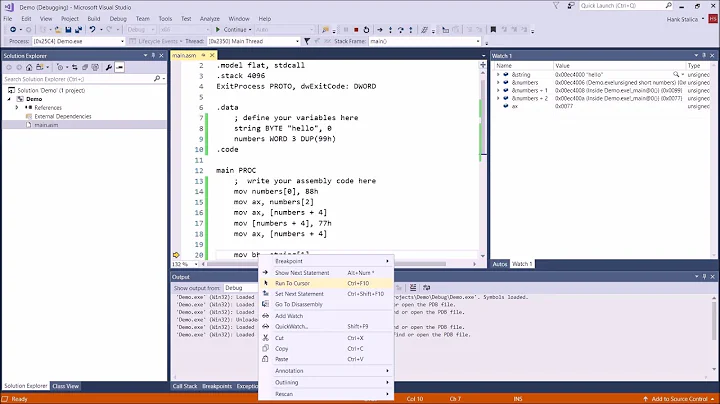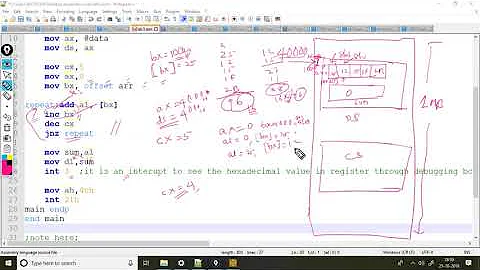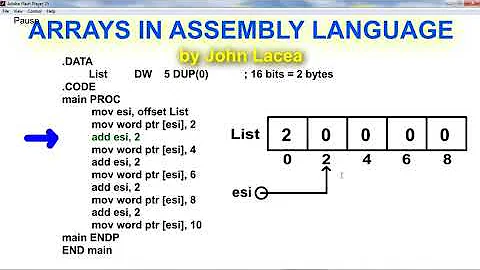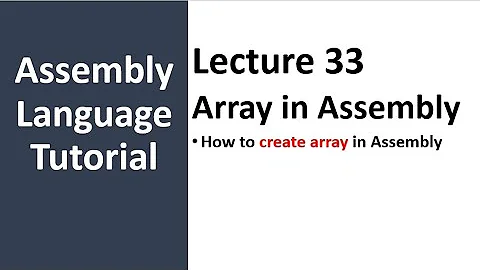How to check an "array's length" in Assembly Language (ASM),
Solution 1
Assembly is a lot more lowlevel than Java. This, among other things, means there's no such thing as an "array". At least in the safe Java form in which you know it.
What would be equivalent to an array is allocating a chunk of memory, and treat it as an array. The length and such you'll have to manage yourself, though, as all you have is a chunk of memory containing your data. If you want to store any metadata, such as length, you'll have to do that yourself.
Arrays as you know them in Java contain metadata such as length, and do bounds checking. These do the same thing you'll have to do, only they hide it so you won't have to worry about those things.
I suggest you take a look at the following for an introduction on how one would commonly create and use what is equivalent to an array in assembly:
Solution 2
There is no such thing as an array in assembly (as far as I know). You are free to invent how an array works if you wish.
If you're reading the assembly generated by a compiler then you will have to ask specifically about that compiler.
One way of doing this would be to allow the first byte of the array to store the length of each element. Another way would be to null terminate the array (this is generally how strings are maintained).
Solution 3
I found this thread very enlightening on the subject: Asm Examples: Finding the size of an array with different data types
Solution 4
a db 10h,20h,30h,40h,50h,60h
n db n-a
in the above code 'a' is an array having 6 elements by default 'a' will point to the first element of the array and 'n' will be initialised just after the array. so value 'n-a' will correspond to the length of the array which we are storing in n. don't initialise other variables in between a and n. This might give you wrong results.
Solution 5
You could use the following program (ATT assembly syntax) to determine the number of elements in an array:
.section .data
array:
.long 3,5,8 # create an array of 32-bit integers
arrsize = . - array # in bytes (assemble-time constant, not stored)
arrlen = (. - array)/4 # in dwords
.section .text
.globl _start
_start:
mov $arrlen, %edi
mov $60, %eax # __NR_exit in asm/unistd_64.h
syscall # sys_exit(arrlen)
Assemble and link the program:
gcc -c array.s && ld array.o
#or
gcc -nostdlib -static array.s
The result is 3, as expected:
>./a.out # run program in shell
>echo $? # check the exit status (which is the number of elements in the array)
3
Related videos on Youtube
Mike
Updated on October 18, 2020Comments
-
Mike over 3 years
I just started learning Assembly language. In java, if we have an Array, we can always use array.length to get its length. Is there such a thing in assembly? If so, can someone please guide me here?
Edit:
My apologies, I know assembly doesn't have arrays, I was trying to simplify things.
What I meant was, if for example I have a variable
data DB 1,2,3,5,7,8,9,10Given that DB can contain any amount of elements, how can i check the total variable it contains?
Something like java, where use int array to store this
int data = {1,2,3,4,57,8,9,10};We can just data.length to find the total amountt of elements.
-
Sebastian Paaske Tørholm about 13 yearsThere is no such thing as an inherent length of arrays. Arrays are just a chunk of memory you put things in. You don't have any way of knowing what size it is; you'll need to keep track of this yourself.
-
-
 Jose Manuel Abarca Rodríguez almost 8 yearsCompiler EMU8086 doesn't seem to recognize
Jose Manuel Abarca Rodríguez almost 8 yearsCompiler EMU8086 doesn't seem to recognizelengthofkeyword. What compiler do you use? -
 Jose Manuel Abarca Rodríguez almost 8 yearsCompiler EMU8086 doesn't seem to recognize
Jose Manuel Abarca Rodríguez almost 8 yearsCompiler EMU8086 doesn't seem to recognizelengthofkeyword. What compiler do you use? -
 Peter Cordes over 5 yearsYou don't need
Peter Cordes over 5 yearsYou don't needdivto divide by 4! Use a right shift. Or better, use an assemble-time operator, likelen = (. - array) / 4. Also, the 32-bitint 0x80ABI take the first arg in EBX, so your code doessys_exit(4). I confirmed on my own desktop. If you were thinking of the 64-bit ABI forsyscall, you'd usemovzbl %ax, %edi, not%si. (Unless you're using a 32-bit install,gcc -candldwill make 64-bit code, so What happens if you use the 32-bit int 0x80 Linux ABI in 64-bit code? also applies.) -
builder-7000 over 5 yearsThanks for pointing out the problems with the original answer. I find the updated answer much clearer by avoiding the use of the
divinstruction. -
 Peter Cordes over 5 yearsBTW, you original also depended on
Peter Cordes over 5 yearsBTW, you original also depended on%dxbeing zero fordivto not overflow and raise a #DE exception (causing Linux to deliver a SIGFPE). So it crashed if you linked it as a dynamic executable. But anyway,shr $2, %ediis what you should use for runtime unsigned division by 4 in cases where you want that, neverdiv. (Also, 16-bit operand-size is generally slower, especially in 32 and 64-bit mode. See agner.org/optimize)








